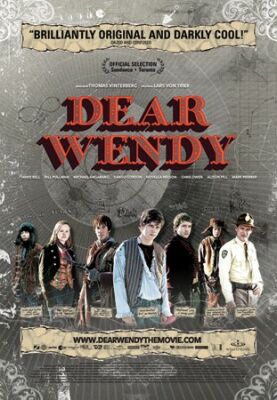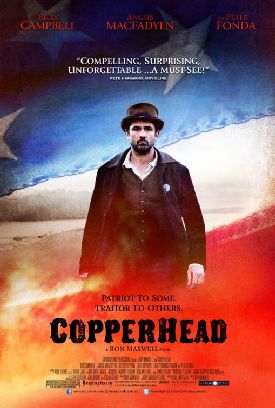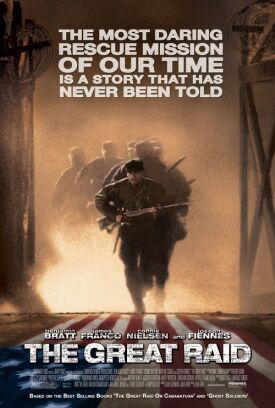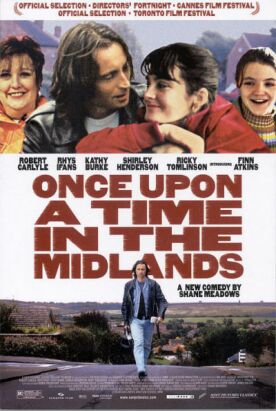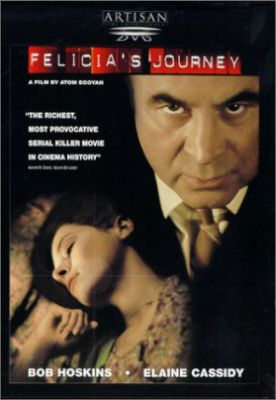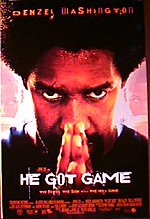Dear Wendy
Opening this week are not one but two films by foreigners seeking to explain America’s “culture of violence.” One, A History of Violence by David Cronenberg, a Canadian, has a serious though, I believe, mistaken point of view. Altogether more frivolous is Dear Wendy, by Thomas Vinterberg (director) and Lars von Trier (writer), who are Danes. Their idea is that it is guns themselves whose erotic charge draws us to them and makes us, willy-nilly, commit violent acts. This seems to me to be self-evident nonsense, but up until the film’s violent climax when it becomes obvious as the film-makers’ guiding principle, we can enjoy it for virtues which have nothing to do with its doubtful social psychology. Though in most ways it is an almost indescribably silly movie, it is also rather fun.
Partly this is because of the strong performance of the young British actor, Jamie Bell (Billy Elliot) in the central role. He plays Dick Dandelion, the son of a coal miner in the run-down Electric Park section of the coal-mining town of Estherslope. Meant to be generic America, this town is so strange that it is impossible for any American to take it seriously. Von Trier, who wrote the script, has famously never been to America — which hasn’t prevented him in such earlier films as Dancer in the Dark and Dogtown from savagely criticizing America — and Vinterberg’s transatlantic visits have been few and brief. Their film was made in Denmark and Germany, but it looks as if it has been set on one of the remoter moons of Saturn.
Dick’s mother is gone, and he is estranged from his father. His only friend is the black housekeeper, Clarabelle (Novella Nelson), who one day urges him to go to a birthday party for her grandson, Sebastian (Danso Gordon). Dick buys Sebastian what he takes to be a toy gun as a present, but this he finds it difficult to square with his “pacifist” conscience. Unable to take the gun back, he drops it in a box. Years later, as he is cleaning out the house after his father dies, Dick finds the gun and shows it to Stevie (Mark Webber), a fellow-employee of the supermarket where he works stocking shelves. Stevie turns out to be immensely knowledgeable about firearms. He tells Dick that the gun is not a toy but a 6.6 mm. double action revolver. He also shows him his own weapon, an Italian made 7.63 mm. pistol brought home as a souvenir from the battle of El Alamein by an uncle.
Stevie calls his gun “Bad Steel” and suggests to Dick that he should name his too. Because it is considered to be a woman’s gun on account of its smallness, Dick names it Wendy. Most of the film consists of Dick’s letters, given in voiceover, to Wendy, whom he treats as a lover. He and Stevie both consider themselves pacifists, but both like the feeling of power and confidence that comes from carrying concealed weapons. They begin to practise shooting them in an abandoned mine shaft. Soon they invite other kids from the town who are considered misfits and outsiders to join them, and to bring their own guns. They call themselves “the Dandies,” electing Dick to be their leader, and adopt a whole set of rituals about their guns, which they all name, as well as a private vocabulary and a set of fantastical costumes. These are meant to be reminiscent of the dandies of Regency England — though there are also elements of Oscar Wilde and Evelyn Waugh in the mix.
The one thing all agree on is that their guns are never to be used outside “the Temple” or club meeting place in the mineshaft. “The most important thing for a Dandy is never to show off his partner for any reason. . . It may be carried but not brandished.”
“Knowing about it but not doing it makes you stronger and better,” theorizes Dick.
What is good about the film is this take on the attempts of a bunch of moony youths who feel excluded from the larger society around them to invent their own social context. Their world becomes compelling to us partly because we are forced to inhabit it ourselves. Almost the only representatives of the world apart from the Dandies are Clarabelle and the dubiously human Sheriff Krugsby (Bill Pullman). I think it is on one level a flaw in the film that the Dandies are in fact the only young people we see in the movie. They are supposedly losers and misfits, though it is hard to see them as such when we see not so much as a single winner or socially successful person. On another level, however, this is a flaw only if the film were to be taken seriously. As this is not possible for other reasons, the absence of other kids from Electric Park is an dramatic advantage as it makes us believe in them as otherwise we could hardly do.
But it also means that, because we never see what they are misfitting with, it’s hard to keep them in focus as misfits — or anything other than Dandies. As a result, the film’s claims to social significance are vitiated. Vinterberg has tried to tie the film in with the Columbine school shootings, but its remoteness from reality, which is what makes it enjoyable, is also what makes it worthless as social commentary. Whatever else may be said about Columbine, it didn’t happen in the same world inhabited by this movie. Vinterberg has also been quoted as saying that “Pacifists with weapons is what most of the Western world consider themselves.” This is telling because though not remotely true of “most of the Western world” it is true of the intellectual classes of progressive countries like Denmark and is becoming more true of the same classes in America all the time.
In other words, what the film is describing for us is an argument among progressives between those who are true believing pacifists — and so, of course, have nothing to do with guns — and those who only have pacifist sympathies but are not sufficiently other-worldly to disavow guns and “violence” altogether. It is the latter which is probably the larger faction, but it is riven with self-doubt and perhaps guilt for the impurity of its views. That, I take it, is what makes America so attractive as a target for the likes of Von Trier and Vinterberg. Because we are on the whole less guilty about our willingness to defend ourselves, we invite them to attack us as the world’s premiere example of what they, in their own fancy, are not. The climactic shootout-ballet between the Dandies and an army of police led by Sheriff Krugsby has its funny moments, as surrealism generally does, but its allusions to the spaghetti-Westerns of Sergio Leone or Butch Cassidy and the Sundance Kid are a kind of film-maker’s shorthand for what has long since become the hackneyed view that it is American culture which produces the violent ending. I can’t see anyone’s being persuaded of this who doesn’t already believe it.
Discover more from James Bowman
Subscribe to get the latest posts to your email.

